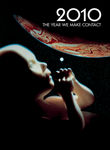 Nine years after the crew aboard the Discovery went missing near Jupiter following the appearance of a second Monolith, humans are venturing forth into our solar system once again to decipher the events. Russia is more than a year ahead of the United States in preparations, however, and the primary issue for many people is the pride of getting there first. While still harboring ill will that can potentially jeopardize the expedition, the two countries unite in their efforts (shades of Dr. Strangelove?). Peter Hyams directs this foretelling sequel to Stanley Kubrick's 2001: A Space Odyssey based on the novel by Arthur C. Clarke.
Nine years after the crew aboard the Discovery went missing near Jupiter following the appearance of a second Monolith, humans are venturing forth into our solar system once again to decipher the events. Russia is more than a year ahead of the United States in preparations, however, and the primary issue for many people is the pride of getting there first. While still harboring ill will that can potentially jeopardize the expedition, the two countries unite in their efforts (shades of Dr. Strangelove?). Peter Hyams directs this foretelling sequel to Stanley Kubrick's 2001: A Space Odyssey based on the novel by Arthur C. Clarke.It is no secret that I very strongly consider 2001 to be the greatest film ever made. As described in the documentary Stanley Kubrick: A Life in Pictures, Kubrick and Arthur C. Clarke conceived the idea and plot structure before parting ways to create separate works - the film and the book, respectively. The symbolic finale to the film ended up baffling many people, including Clarke himself, who admittedly did not immediately comprehend Kubrick's accomplishment. Clarke must have eventually embraced the finale, however, as his literary follow-up, 2010, suggests what could happen after such events. Rather than leaving the ambiguous prophecy for the prosperity of mankind be, he creates a story that explains the occurrences that brought the prophecy forth.
For the first half of the film, the only elements reminiscent of the original piece are certain sound effects, aspects of the score, and the occasionally reserved, wide-angle photography. Most everything else evades the perpetual omnipotence of the first Odyssey and resorts to temporary effectiveness. When we get to Jupiter, however, business really picks up. From literally stunning, new visuals to some great cues from 2001, it becomes a highly captivating film that pays off well.
In and of itself, 2010 is by no means a bad film - it's actually very good. Following the greatest film ever made is not an easy task, and Kubrick's shadow creates most of the reason 2010 catches flack. One might guess that Hyams knew there was no way possible to follow Kubrick and it is with this confidence that he goes forward to create a very satisfying experience. In fact, I think James Cameron took more than a few cues from this film when he made The Abyss. Fear not, this isn't another Son of Kong (although that one is admittedly very fun).

